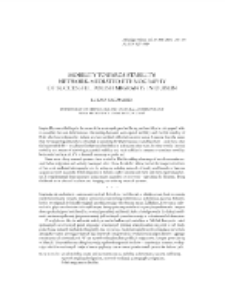- Search in all Repository
- Literature and maps
- Archeology
- Mills database
- Natural sciences
Advanced search
Advanced search
Advanced search
Advanced search
Advanced search

Object
Title: Mobility Towards Stability: Network-Mediated Ethnography of Successful Polish Migrants in Dublin
Subtitle:
Ethnologia Polona 37 2016 (2017)
Publisher:
Institute of Archaeology and Ethnology Polish Academy of Sciences
Place of publishing:
Description:
Type of object:
Abstract:
Inspired by some findings in the areas of the anthropology of wellbeing and mobility, in this paper I wish to consider the non-dichotomous relationship between socio-spatial mobility and the life stability of Poles who have migrated to Ireland and are satisfied with their current status. I assume that the status that my research partners have obtained is satisfying for them because it enables them – and those they feel responsible for – to achieve further social mobility in a direction they want. In other words, they see mobility as a means of achieving successful stability, and such stability is a means to continue mobility, both social and spatial, if it is deemed necessary or preferred. Since most of my research partners have settled in Dublin taking advantage of social networks created before migration and actively developed after, I have decided to follow in their footsteps in the form of ‘network-mediated ethnography’, to by using my existing network of family and friends to become acquainted with successful Polish migrants in Ireland, and to understand them and their experiences better. I complemented these attempts using means accessible to everyone – searching the Internet, doing fieldwork in in selected localities and hanging out with my research partners
References:
Brettell C. B. 2000. Theorizing migration in anthropology: The social construction of networks, identities, communities and globalscapes. In C.B. Brettell and J.F. Hollifield (eds.), Migration Theory, London, 97–135
Dahinden J. 2010. The dynamics of migrants’ transnational formations: Between mobility and locality. In R. Bauböck and T. Faist (eds.), Diaspora and Transnationalism: Concepts, Theories and Methods, IMISCOE Research, Amsterdam, 51–71
Fischer E. F. 2014. The Good Life: Aspiration, Dignity, and the Anthropology of Wellbeing, Stanford
Graham C. 2011. The Pursuit of Happiness: An Economy of Well-Being, Washington D.C
Kearney M. 1995. The Local and the Global: The Anthropology of Globalization and Transnational¬ism, Annual Review of Anthropology 24, 547–565
Marcus G. 2004. Ethnography Through Thick and Thin, Princeton
Nowicka M. 2014. Erfolgsnarrationen polnischer Migrantinnen und Migranten in Großbritannien oder: Wie Scheitern unsichtbar wird. In R. John and A. Langhof (eds.), Scheitern – Ein Desiderat der Moderne? Wiesbaden, 143–165
Pawlak M. 2015. Othering the Self: National Identity and Social Class in Mobile Lives. In H. Cervinkova, M. Buchowski, Z. Uherek (eds.), Rethinking Ethnography in Central Europe, New York
Wilson T. 1994. What Determines Where Transnational Labour Migrants Go? Modifications in Migration Theories, Human Organization 53 (3 Fall), 269–278
Relation:
Volume:
Start page:
End page:
Detailed Resource Type:
Format:
Resource Identifier:
oai:rcin.org.pl:66281 ; 0137-4079
Source:
IAiE PAN, call no. P 366 ; IAiE PAN, call no. P 367 ; IAiE PAN, call no. P 368 ; click here to follow the link
Language:
Rights:
Digitizing institution:
Institute of Archaeology and Ethnology of the Polish Academy of Sciences
Original in:
Library of the Institute of Archaeology and Ethnology of the Polish Academy of Sciences
Access:
Object collections:
- Digital Repository of Scientific Institutes > Partners' collections > Institute of Archeology and Ethnology PAS > Institute Publications
- Digital Repository of Scientific Institutes > Partners' collections > Institute of Archeology and Ethnology PAS > Institute Publications > Current Journals
- Digital Repository of Scientific Institutes > Literature > Books/Chapters
- Digital Repository of Scientific Institutes > Literature > Journals/Articles
- Digital Repository of Scientific Institutes > Partners' collections > Institute of Archeology and Ethnology PAS > Institute Publications > Current Journals > Ethnologia Polona
Last modified:
Feb 2, 2022
In our library since:
Sep 26, 2018
Number of object content downloads / hits:
85
All available object's versions:
https://rcin.org.pl./publication/85958
Show description in RDF format:
Show description in RDFa format:
Show description in OAI-PMH format:
Objects Similar
Szymoszyn, Anna
Szczepaniak-Kroll, Agnieszka
Mach, Bogdan Wojciech (1952– )
Wolnicz-Pawłowska, Ewa (1947– )
Gajewski, Krzysztof
Kiełbasiński Konrad

 INSTYTUT ARCHEOLOGII I ETNOLOGII POLSKIEJ AKADEMII NAUK
INSTYTUT ARCHEOLOGII I ETNOLOGII POLSKIEJ AKADEMII NAUK
 INSTYTUT BADAŃ LITERACKICH POLSKIEJ AKADEMII NAUK
INSTYTUT BADAŃ LITERACKICH POLSKIEJ AKADEMII NAUK
 INSTYTUT BADAWCZY LEŚNICTWA
INSTYTUT BADAWCZY LEŚNICTWA
 INSTYTUT BIOLOGII DOŚWIADCZALNEJ IM. MARCELEGO NENCKIEGO POLSKIEJ AKADEMII NAUK
INSTYTUT BIOLOGII DOŚWIADCZALNEJ IM. MARCELEGO NENCKIEGO POLSKIEJ AKADEMII NAUK
 INSTYTUT BIOLOGII SSAKÓW POLSKIEJ AKADEMII NAUK
INSTYTUT BIOLOGII SSAKÓW POLSKIEJ AKADEMII NAUK
 INSTYTUT CHEMII FIZYCZNEJ PAN
INSTYTUT CHEMII FIZYCZNEJ PAN
 INSTYTUT CHEMII ORGANICZNEJ PAN
INSTYTUT CHEMII ORGANICZNEJ PAN
 INSTYTUT FILOZOFII I SOCJOLOGII PAN
INSTYTUT FILOZOFII I SOCJOLOGII PAN
 INSTYTUT GEOGRAFII I PRZESTRZENNEGO ZAGOSPODAROWANIA PAN
INSTYTUT GEOGRAFII I PRZESTRZENNEGO ZAGOSPODAROWANIA PAN
 INSTYTUT HISTORII im. TADEUSZA MANTEUFFLA POLSKIEJ AKADEMII NAUK
INSTYTUT HISTORII im. TADEUSZA MANTEUFFLA POLSKIEJ AKADEMII NAUK
 INSTYTUT JĘZYKA POLSKIEGO POLSKIEJ AKADEMII NAUK
INSTYTUT JĘZYKA POLSKIEGO POLSKIEJ AKADEMII NAUK
 INSTYTUT MATEMATYCZNY PAN
INSTYTUT MATEMATYCZNY PAN
 INSTYTUT MEDYCYNY DOŚWIADCZALNEJ I KLINICZNEJ IM.MIROSŁAWA MOSSAKOWSKIEGO POLSKIEJ AKADEMII NAUK
INSTYTUT MEDYCYNY DOŚWIADCZALNEJ I KLINICZNEJ IM.MIROSŁAWA MOSSAKOWSKIEGO POLSKIEJ AKADEMII NAUK
 INSTYTUT PODSTAWOWYCH PROBLEMÓW TECHNIKI PAN
INSTYTUT PODSTAWOWYCH PROBLEMÓW TECHNIKI PAN
 INSTYTUT SLAWISTYKI PAN
INSTYTUT SLAWISTYKI PAN
 SIEĆ BADAWCZA ŁUKASIEWICZ - INSTYTUT TECHNOLOGII MATERIAŁÓW ELEKTRONICZNYCH
SIEĆ BADAWCZA ŁUKASIEWICZ - INSTYTUT TECHNOLOGII MATERIAŁÓW ELEKTRONICZNYCH
 MUZEUM I INSTYTUT ZOOLOGII POLSKIEJ AKADEMII NAUK
MUZEUM I INSTYTUT ZOOLOGII POLSKIEJ AKADEMII NAUK
 INSTYTUT BADAŃ SYSTEMOWYCH PAN
INSTYTUT BADAŃ SYSTEMOWYCH PAN
 INSTYTUT BOTANIKI IM. WŁADYSŁAWA SZAFERA POLSKIEJ AKADEMII NAUK
INSTYTUT BOTANIKI IM. WŁADYSŁAWA SZAFERA POLSKIEJ AKADEMII NAUK




































